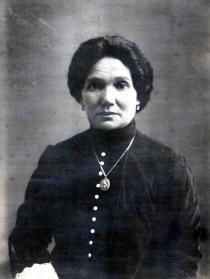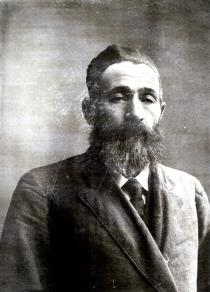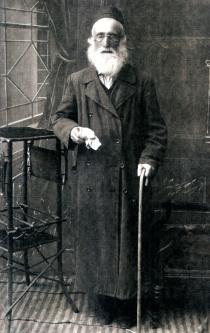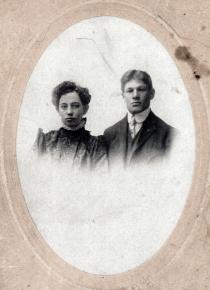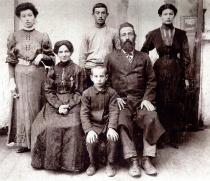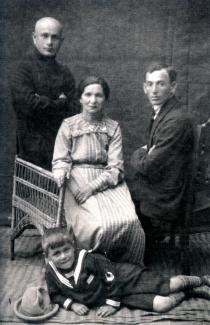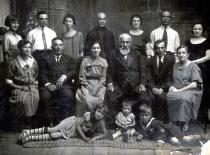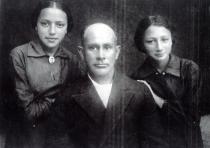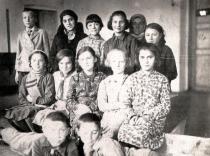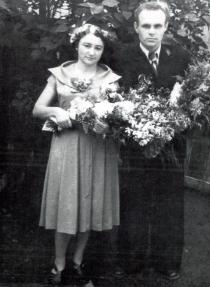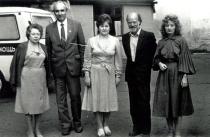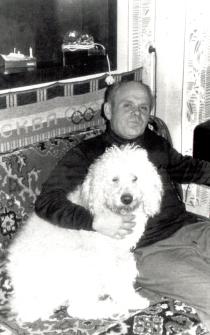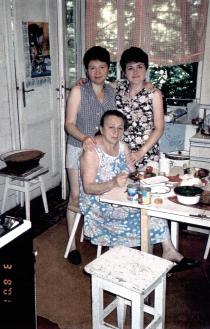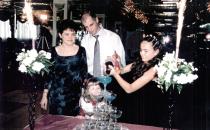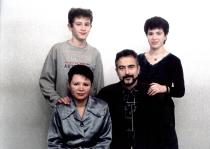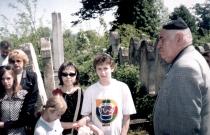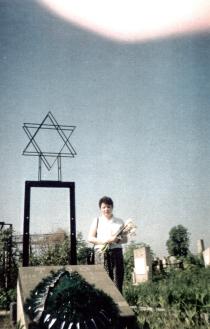My maternal grandfather, Iosif Schigol photographed in Polonoye in the 1900s.
My mother's father was born in Polonoye in the 1860s. He died in 1927, before I was born. My grandfather was a construction materials supplier. I don't know exactly what he supplied, something like bricks, wood, nails, cement, and so on, to landlords. He built a good brick house for his family. It was a big house. Theirs was a wealthy family. Their daughters and sons had rooms, there was their parents' bedroom, my grandfather's study, a dining-room and a living-room, besides a kitchen and bathroom and storerooms. They had good solid furniture. It wasn't posh, but they had all they needed: chairs, tables, beautiful wooden wardrobes and chests of drawers. They had books I believe they were mostly religious books in Yiddish. They also had classical world literature in Yiddish.
My grandfather and grandmother went to synagogue at least once a week, and they prayed at each meal, in the morning and before going to bed. There was a big choral and two or three smaller synagogues in Polonoye. My grandfather wore a black jacket and a hat. At home he wore a yarmulka on his head. He had a small beard. They always celebrated the Sabbath at home. My grandmother lit candles and cooked a festive dinner. My grandfather read a prayer. I don't remember them singing. My grandmother strictly followed the laws of kashrut. They celebrated all the Jewish holidays. At Pesach they bought matzah, made stuffed fish, chicken, goose cracklings and stuffed chicken necks. They baked strudels with jam, nuts and raisins, sponge cake from matzah flour and special Pesach cookies. All the adults and children over 11 fasted on Yom Kippur. There was Chanukkah gelt at Chanukkah and concerts of klezmer musicians at Purim. They celebrated some other holidays, too, but I don't remember which ones. They spoke Yiddish in the family, and they knew Russian and Ukrainian very well.
My grandfather began to have problems in 1925. Everybody in the village knew that he had money. State security officers were beginning to take away valuables from wealthy people. They summoned my grandfather to the committee and demanded that he gave them his gold. My grandfather was scared and gave them all he had. Mama kept only a few pieces of jewelry that she had received as her wedding gift from her father. Anyway, this committee didn't leave him alone. The local communists who had become state security officers constantly persecuted my grandfather. They knocked on the windows and doors at night shouting for my grandfather to give away the gold that he had stolen from the people. He kept telling them that he had nothing left, but in vain. They called him to the committee almost every week. Once, they arrested him and kept him in a cell for over a week. Then they let him go, offering no explanation. My grandfather had a poor heart and every such visit ended in a heart attack. He was living in constant tension. They threatened to send him into exile or shoot him 'accidentally' in the street. My grandfather Iosif died from a myocardial infarction in 1927, after another visit to the state security committee office. He never tried to leave his own town. He believed he was innocent and didn't owe anything to the authorities after he had given away all he had. He was hoping that they would leave him alone one day.

